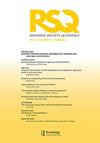Framing Palestinian Rights: A Rhetorical Frame Analysis of Vernacular Boycott, Divestment, Sanctions (BDS) Movement Discourse
IF 1.1
2区 文学
Q3 COMMUNICATION
引用次数: 0
Abstract
ABSTRACT This essay applies rhetorical framing analysis to vernacular student-created discourse promoting the Palestinian-led boycott, divestment, and sanctions (BDS) movement and Palestinian rights. The results of this study suggest that pro-BDS student activist-rhetors typically frame the BDS movement as a nonviolent movement to achieve Palestinian rights and hold Israel accountable for an ongoing system of oppression, discrimination, settler colonialism, and apartheid against Palestinians. This framing relies on the values of justice, freedom, equality, and joint struggle—values that strongly overlap with social and racial justice discourses focusing on intersectionality and justice for marginalized and oppressed peoples. In response to the rhetorical ecology for pro-BDS discourse, including counterframing by Israel advocates and the doxa that BDS is antisemitic, pro-BDS activist-rhetors regularly denounce antisemitism, emphasize Jewish support for the BDS movement, and draw comparisons to other struggles for justice and liberation.建构巴勒斯坦权利:白话抵制、撤资、制裁运动话语的修辞框架分析
本文运用修辞框架分析白话学生创造的话语,促进巴勒斯坦领导的抵制,撤资和制裁(BDS)运动和巴勒斯坦权利。这项研究的结果表明,支持BDS的学生活动家通常将BDS运动描述为一场非暴力运动,目的是实现巴勒斯坦人的权利,并让以色列对其持续的压迫、歧视、定居者殖民主义和种族隔离制度负责。这一框架依赖于正义、自由、平等和共同斗争的价值观,这些价值观与社会和种族正义话语强烈重叠,这些话语关注的是相互交织性,以及边缘化和被压迫人民的正义。为了回应支持BDS的话语的修辞生态,包括以色列倡导者的反框架和BDS是反犹主义的教条,支持BDS的活动家经常谴责反犹主义,强调犹太人对BDS运动的支持,并将其与其他争取正义和解放的斗争进行比较。
本文章由计算机程序翻译,如有差异,请以英文原文为准。
求助全文
约1分钟内获得全文
求助全文

 求助内容:
求助内容: 应助结果提醒方式:
应助结果提醒方式:


